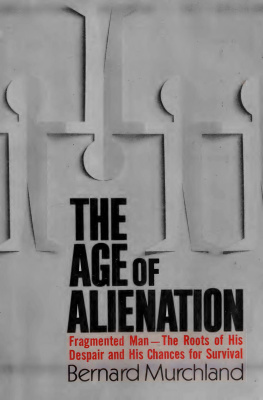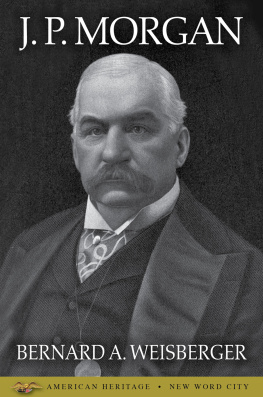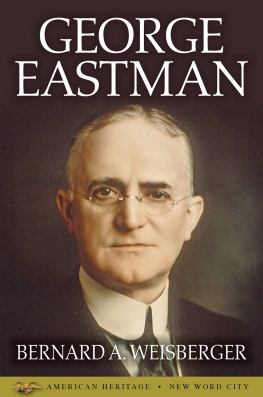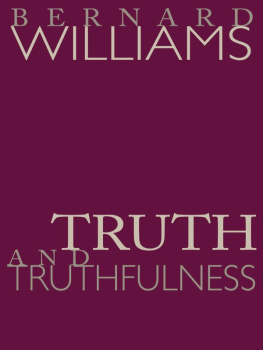[Text on front and back flaps]
In this brilliant and timely essay Bernard Murchland examines the complex term we use (and overuse) to explain a lot of what we feel, sense, think about the world we live in. So many of our opinions about how things are going express the theme of alienationa term which, as the author points out, obviously suffers from too much generality. But what our present discontents have in common is that we feel helpless before them, our frustration is unrelieved by any proportionate hope for future resolution.
Our society is so complex and frightening, Dr. Murchland writes, and solutions so difficult to come by that a kind of paralysis of will has descended upon us. Alienation emerges as the inclusive category which points to our personal and social frustrations, to our sense of collapse and doom and to the critical nature of the human predicament at this juncture in history.
ls this an isolated, purely modern experience? Or is it a recurring experience throughout our history? Are there simply times when the human estate is at a low ebb, when the culture seems to have collapsed and to be only tenuously connected to the sources of its replenishment?
The Age of Alienation explores the shades of meaning the word has in contemporary usages. The sociologists define alienation in terms of social relations; the psychologists speak of ids and egos and behavior; artists stress the emotional consequences; political thinkers analyze conflict and destruction; philosophers and theologians tend to see it as something inherent in the world structure.
The antecedents of the modern phenomenon of alienation run deep, the author writes. Many of our present dilemmas originate in the uses to which reason has been put in the course of history. Murchland discusses the works of such men as Freud, Kafka, Sartre, Camus, Marcusein terms of their antecedents, Descartes, Rousseau and Hegel.
Drawing together the themes that various thinkers have suggested, the author concludes that alienation is not inherent but man-made, that the conflicts between various impulses and dogmas have pulled man apart. One example of this tension is orthodox Christianity, which is seen to have shoved man into difficulties with his own nature.
Murchland does not offer any final theory of dealienation, but suggests that De-alienation is basically a matter of unifying, of connecting up the scattered fragments of our experience. And this work of connection is essentially a matter of creativity, which is to say the work of intelligence functioning imaginatively. One reason man has survived is that he has a genius for creating myths, by which is meant shared experiences which give cohesion and purpose to our social institutions and sustain our value patterns.
The historical record indicates, Bernard Murchland writes, that an answer to the problem of alienation is to be found in redirecting our creative energies.
Bernard Murchland is professor of philosophy at Ohio Wesleyan University. He received his Ph.D. from the State University of New York at Buffalo. He has edited The Meaning of the Death of God and Two Views of Man , and written for Commonweal, worldview, The New Republic, The Wall Street Journal , and many scholarly journals.
Jacket design by Wendell Minor
Photograph by Paul Weller
Random House, Inc., New York, N.Y. 10022
Publishers of THE RANDOM HOUSE DICTIONARY
OF THE ENGLISH LANGUAGE: the Unabridged
and College Editions, The Modern Library and
Vintage Books Printed in U.S.A.
THE
AGE
OF
ALIENATION
also by Bernard Murchland
The Meaning of the Death of God (editor)
THE
AGE
OF
ALIENATION
Bernard Murchland
 Random House: New York
Random House: New York
Some materials from Part II originally appeared in Buffalo Studies and portions of Part III were first published in worldview. They are used here with permission.
The Peace of Wild Things, by Wendell Berry, is reprinted from his volume Openings, by permission of Harcourt, Brace, Javanovich, Inc. Copyright (C) 1968 by Wendell Berry.
Copyright 1971 by Bernard Murchland
All rights reserved under International and
Pan-American Copyright Conventions. Published in
the United States by Random House, Inc., New York
and simultaneously in Canada by Random House
of Canada Limited, Toronto.
ISBN: O-394-46253-X
Library of Congress Catalog Card Number: 74-117687
Manufactured in the United States of America
by Haddon Craftsmen, Inc., Scranton, Pa.
2 3 4 5 6 7 8 9
First Edition
For Joan
Digitized by the Internet Archive in 2018 with funding from Kahle/Austin Foundation
https://archive.org/details/ageofalienation0000murc
All burrowing into existence consists in establishing connections.
S. Kierkegaard
The net effect of the establishment of a boundary between self and the external world is inside-out and outside-in: confusion. The erection of a boundary does not alter the fact that there is, in reality, no boundary. The net-effect is illusion: the big lie. Or alienation.
Norman O. Brown
The true mystery of the world is the visible, not the invisible.
Oscar Wilde
Everyone is more or less sick of the plague.
Albert Camus
Preface
We seem indisputably to be living through one of those periods of cultural collapse that periodically overtake history, a time when the human estate is at low ebb, only tenuously connected to the sources of its replenishment. We live, as it has become fashionable to say, under the dispensation of alienation. Alienation is indeed a term of the first importance in our lexicon of cultural criticism.
It is also, as one would expect, a complex term. No one study can hope to be more than explorative and tentative. This is particularly true of my own study. The first level of complexity concerns the different shades of meaning the word alienation has in contemporary usages. Sorting these out, analyzing their content and relating them one to the other constitute an immense critical task. Secondly, the intellectual antecedents of the modern phenomenon of alienation run deep. I have rather stressed this aspect of the problem in the following essay because, quite apart from being a neglected aspect, it reveals something important about mans historical being. It has become clear to me that many of our present dilemmas originate in the uses to which reason has been put in the course of history. To say that our roots are in the past is to say among other things that we have inherited a cluster of ideas, values and attitudes that are in essence alienative. Effective social criticism today, therefore, must include an analysis of received beliefs in light of their origins. Critical thinking functions in one of its most useful modes when it clarifies our social reality through an examination of the key concepts of our cultural tradition. Taking this as a guiding principle, I have tried to show that an ideology of alienation lies close to the heart of Western mans principal cultural expressions. This ideology has been transmitted to us and forms part and parcel of what has been quite appropriately called the exhausting logic of modern life.
But I do not want to exaggerate the historical aspect of the problem. The benefits of history are always to some extent dubious, even as our understanding of it is partial. A far more crucial question is how alienation is to be overcome. There is, of course, no way of answering this question satisfactorily, for the simple reason that no one knows the future. Our present predicament stirs our curiosity but it cannot settle our doubt in this regard. To be modern is to be a castle seeker, to quest more than to find. But even here, history provides a clue by furnishing us with the record of mans survival ability. Man has always survived his major cultural crises because of his resourcefulness, his imagination, his creativity. He has survived, in a word, because of his genius for inventing suitable myths. Myth, in this strong sense of the word, I understand to be those shared experiences which give cohesion and purpose to our social institutions and sustain our value patterns. For example, after the collapse of the Roman empire, man developed a religion; after the Copernican revolution, a science; after Darwin, progress. And so forth. The myths of the past are rarely serviceable in our present situation, at least not without serious adaptation. More often, in fact, past solutions are present problems. But the historical record does suggest that an answer is to be found in redirecting our creative energies. I explore this line of thought briefly in the final section of my book and conclude that our hope lies in some effective combination of art and politics.
Next page










 Random House: New York
Random House: New York